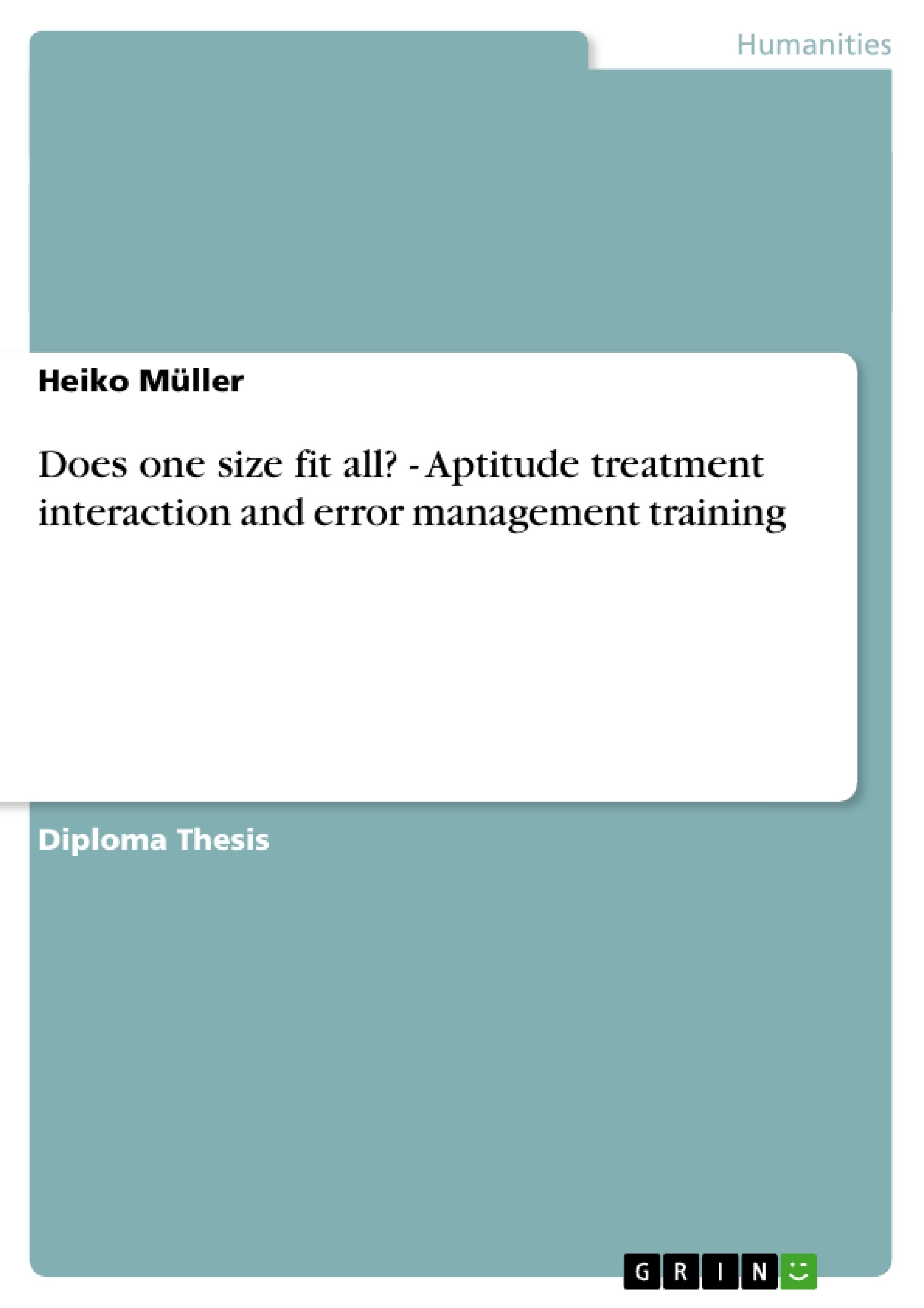
Does one size fit all? - Aptitude treatment interaction and error management training
Diplomarbeit, 2003
173 Seiten, Note: 1,3 (A)
Leseprobe
Inhaltsverzeichnis (Table of Contents)
- 1. Introduction
- 1.1 Error-Management-Training
- 1.2 Error-Management-Instructions
- 1.3 Aptitude-Treatment-Interactions (ATI)
- 1.3.1 Learning strategies
- 1.3.2 Cognitive ability
- 1.3.3 Conscientiousness
- 1.3.4 Neuroticism
- 1.3.5 Openness to experience
- 1.3.6 Goal orientation
- 1.3.7 Achievement motivation
- 2. METHOD
- 2.1 Participants
- 2.2 Training Design
- 2.3 Procedure
- 2.4 Personal Variables
- 2.5 Dependant Variables
- 2.6 Manipulation Checks and Controls
- 3. RESULTS
- 3.1 Preliminary Analysis
- 3.2 Manipulation Checks
- 3.3 Performance Effects
- 3.4 Interactions of Personal Variables and Training Method
- 4. DISCUSSION
- 4.1 Strengths and Limitations of the Study
- 4.2 Implications for Theory and Future Research
- 5. REFERENCES
Zielsetzung und Themenschwerpunkte (Objectives and Key Themes)
This thesis examines the effectiveness of error-management-training in software training, considering the potential influence of various individual characteristics. The study aims to explore the interplay between different training methods (error-avoidant and error-management-training) and personal factors such as cognitive ability, personality traits, goal orientation, and learning strategies. It investigates whether the effectiveness of error-management-training depends on individual differences and if error-management-instructions are crucial for successful error-management-training.
- Effectiveness of Error-Management-Training
- Aptitude-Treatment-Interactions (ATI)
- Role of Individual Characteristics in Learning Success
- Influence of Error-Management-Instructions
- Comparison of Error-Avoidant and Error-Management Training Methods
Zusammenfassung der Kapitel (Chapter Summaries)
The introduction provides a comprehensive overview of error-management-training, explaining its principles and highlighting previous research findings. It discusses the importance of considering individual differences in training research and introduces the concept of aptitude-treatment-interactions (ATI). The chapter then explores the role of specific personal characteristics, such as learning strategies, cognitive ability, personality traits, goal orientation, and achievement motivation, in the context of ATI and their potential impact on learning success.
The second chapter details the methodology of the study. This includes information about the participants, training design, procedure, personal variables assessed, dependent variables measured, and manipulation checks used to ensure the effectiveness of the training conditions.
Chapter three presents the results of the study. It includes preliminary analyses, manipulation checks, performance effects, and the analysis of interactions between personal variables and training methods.
Schlüsselwörter (Keywords)
Error-management-training, aptitude-treatment-interactions (ATI), cognitive ability, neuroticism, openness to experience, conscientiousness, goal orientation, achievement motivation, learning strategies, error-avoidant training, software training, individual differences, personal characteristics, performance, learning success, error-management-instructions.
Frequently Asked Questions
What is Error-Management-Training (EMT)?
EMT is a training method that explicitly allows and encourages participants to make errors during the learning process, using them as opportunities to gain deeper understanding.
How does EMT compare to error-avoidant training?
Error-avoidant training tries to prevent mistakes during practice. While it may feel easier, EMT has been shown in previous research to lead to better test performance and adaptive transfer.
What are Aptitude-Treatment-Interactions (ATI)?
ATI refers to the concept that the effectiveness of a training method (treatment) may depend on the individual characteristics (aptitude) of the learner, such as their personality or cognitive ability.
Which personal characteristics were studied in this research?
The study examined cognitive ability, neuroticism, openness to experience, conscientiousness, goal orientation, achievement motivation, and learning strategies.
What are error-management-instructions?
These are "rules of thumb" provided during training that encourage trainees to view errors positively and learn from them, rather than being frustrated by them.
What was the "wipe out effect" found in the study?
The study found interactions suggesting that EMT might neutralize or "wipe out" the typical impact that certain personal characteristics have on learning success, potentially making the training more robust across different learners.
Details
- Titel
- Does one size fit all? - Aptitude treatment interaction and error management training
- Hochschule
- Justus-Liebig-Universität Gießen
- Note
- 1,3 (A)
- Autor
- Heiko Müller (Autor:in)
- Erscheinungsjahr
- 2003
- Seiten
- 173
- Katalognummer
- V27159
- ISBN (eBook)
- 9783638292801
- Dateigröße
- 1746 KB
- Sprache
- Englisch
- Anmerkungen
- 108 Seiten Anhang
- Schlagworte
- Does Aptitude
- Produktsicherheit
- GRIN Publishing GmbH
- Preis (Ebook)
- US$ 42,99
- Arbeit zitieren
- Heiko Müller (Autor:in), 2003, Does one size fit all? - Aptitude treatment interaction and error management training, München, Page::Imprint:: GRINVerlagOHG, https://www.diplomarbeiten24.de/document/27159
- Autor werden
- Ihre Optionen
- Vertriebskanäle
- Premium Services
- Autorenprofil
- Textarten und Formate
- Services für Verlage, Hochschulen, Unternehmen

- © GRIN Publishing GmbH.
- Alle Inhalte urheberrechtlich geschützt. Kopieren und verbreiten untersagt.
- info@grin.com
- AGB
- Open Publishing
Der GRIN Verlag hat sich seit 1998 auf die Veröffentlichung akademischer eBooks und Bücher spezialisiert. Der GRIN Verlag steht damit als erstes Unternehmen für User Generated Quality Content. Die Verlagsseiten GRIN.com, Hausarbeiten.de und Diplomarbeiten24 bieten für Hochschullehrer, Absolventen und Studenten die ideale Plattform, wissenschaftliche Texte wie Hausarbeiten, Referate, Bachelorarbeiten, Masterarbeiten, Diplomarbeiten, Dissertationen und wissenschaftliche Aufsätze einem breiten Publikum zu präsentieren.
Kostenfreie Veröffentlichung: Hausarbeit, Bachelorarbeit, Diplomarbeit, Dissertation, Masterarbeit, Interpretation oder Referat jetzt veröffentlichen!
- GRIN Verlag GmbH
-
- Nymphenburger Str. 86
- 80636
- Munich, Deutschland
- +49 89-550559-0
- +49 89-550559-10
- info@grin.com
-









